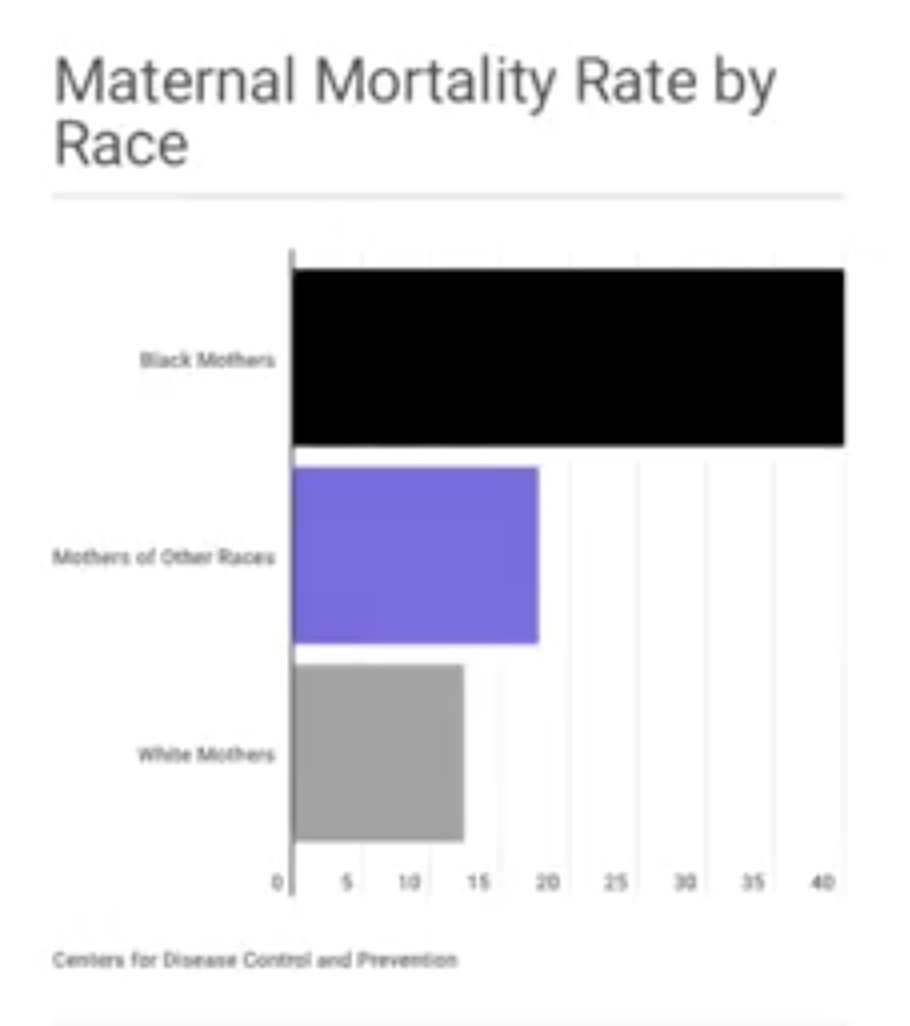By Sanaa Kimathi-Walker
Doctors to black women are equivalent to what policemen are to black men.
While police officers are killing our innocent black men in the streets, doctors are not fulfilling their duties of helping those in need despite their color or background. Black women are being neglected by doctors because of stereotypes that have been passed down for centuries. This is an ongoing issue that is happening currently across America. This is happening because of racism and racism has become a public health crisis as it is affecting the lives of black people, and more specifically pregnant black women.
The first interviewee, journalist Linda Villarosa, a contributor of the 1619 project and contributing writer to the New York Times Magazine, came to speak with HUMMA students. In her interview she presented a powerpoint with the following data of health inequality. She states that black babies are 2.3 times more likely to die than white, and she came up with her own calculation that if the racial gap didn’t exist about 4,000 black babies would be alive. She shows us that research has also found that black women are 3 to 4 times more likely to die for childbirth related reasons than white women. She goes on to talk about the way doctors have formed a narrative which is, “ The black body is different – which means inferior AKA something is wrong with you”.
The stereotypes of black people having poor health habits, lack of education, and no self control play into why they blame African Americans for their illnesses. Another stereotype of black women that she shares with us is that they have too many babies in order to gain money from the government or just because of lack of self control. Villarosa also says, “ The stereotype is that black people have a really high pain tolerance and that means we may be treated differently in the current day medical system that came from slavery when black people were whipped and beaten and they were like well its ok because they have a high pain tolerance”. Villarosa makes her final remarks by saying, “ This racial discrimination is driving down our health status… and its shameful, and it’s wrong, and its unfair. This isn’t a black problem, it’s an American problem.”

My second interview is with Howard University alumna, Kenyatta Matthews who was a former medical student at the Howard University College of Medicine. In this interview she shared her experience of her difficult pregnancy with her only child, Samori Coates. Her personal experience in the aftermath of childbirth attest to the struggles black women face continuously when dealing with childbirth across America. Matthews shares her difficult experience post childbirth and describes that she was beginning to notice weird things going on with her body such as tight skin, abnormal weight gain, and bumps on her back. Her delivery experience was normal and she had a C-section and her baby was healthy, however, her pain continued once she had gone home. She describes that she had a bad shortness of breath and difficulty sleeping, because of this she went back to the doctor and they had told her she had pneumonia. Unfortunately her symtoms didn’t go away and her mother had urged her to go to the doctors once again. When going back to the doctors she says, “ I had just about every extensive test for every organ you could think of”. The doctors still couldn’t explain what the issue was until a cardiologist from Zimbabwe had diagnosed her with postpartum cardiomyopathy. Postpartum cardiomyopathy is an extremely rare form of heart failure that is most prevalent in women of African descent. The medicine prescribed to her only had a 50% chance of working, they had said to her, “ Either your heart will recover or your heart will stay the same. But I got lucky and my heart is back to normal”.
When Matthews recalls her experience with the doctors she explains that the doctors neglected her pain and said she would be fine and she says, “ I think a lot of my concerns were written off because I was a young black mom”. Matthews concerns with how black people are treated by doctors was a huge motivation for why she attended medical school, “ There was one person I felt the whole time I was going through that who I felt saw me which was the African cardiologist… he made me feel okay and saw me as a person which made me wanna do that”. She makes a closing statement saying, “ There was also one thing I really liked about being at Howard’s medical school, their primary philosophy is service and mission in medicine and I feel they are doing a really good job of training people to see everybody to be able to give that kind of care.” Despite the difficulty black mothers have been experiencing with doctors, there are plans set in motion in order to combat this. An NBCNEWS article written by reporter, Elizabeth Chuck, shares that implicit bias training has become more popular in recent years to confront these prejudices going on in the medical field. The article states, “ Bias training typically starts with taking the Harvard Implicit Association Test, which measures automatic associations between categories of people and value judgments through a series of multiple-choice questions.” Along with this test aspiring doctors have been placed in workshops that put people in other people’s shoes to bring awareness. With this information we can leave on a positive note knowing that there are actions that are being put in place in order to get rid of bias that could potentially save the lives of black women.
